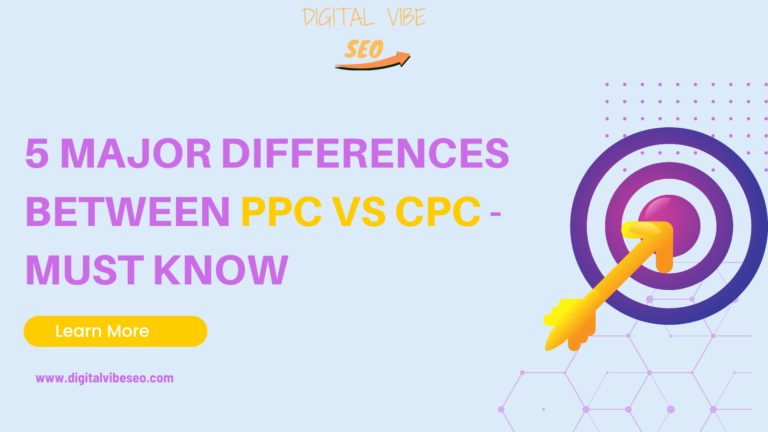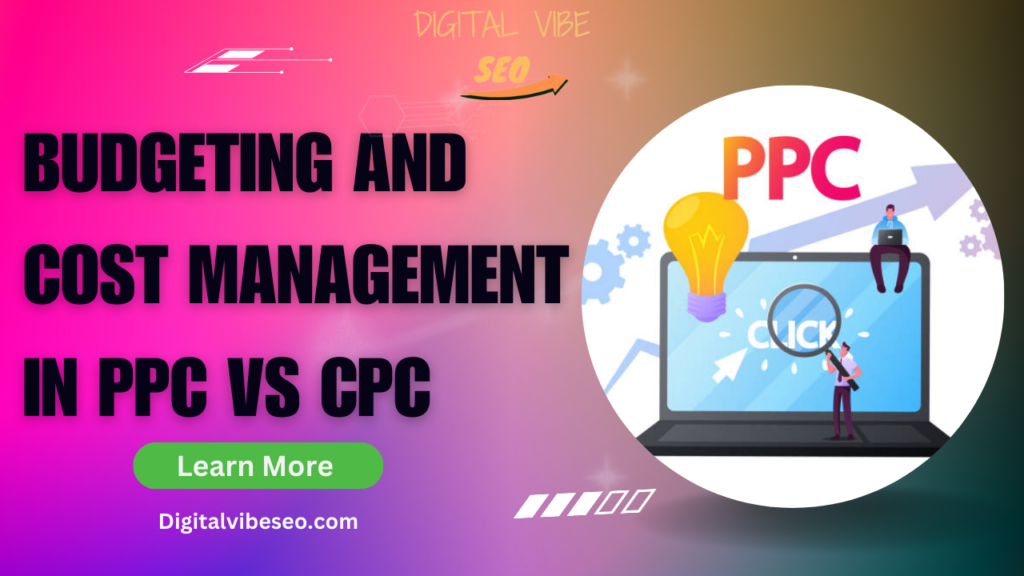
Table of Contents
ToggleIntroduction
It is essential to distinguish between PPC and CPC when it comes to digital marketing; they may sound very similar but they are not the same. As we have mentioned above although they are rooted in the same concepts, they are not equal. In this blog post, we are going to explore five primary features regarding PPC vs CPC to help you make the right calls when it comes to your advertisements.
Pricing Models in PPC vs CPC: Definition and Scope
First of all, to discuss PPC vs CPC, it is necessary to understand that these two terms are not precisely used as synonyms, and they concern different aspects of advertising. It is important to understand these basics to be able to utilize these concepts.
PPC: Pay-Per-Click
PPC is an effective and integrated model of advertising, which is applied mostly in the context of SEA and social networks. In this model, advertisers pay a fee for each click made in the corresponding advertisement. The PPC is a more diverse and more general type of advertising that includes different techniques, types of ads, and channels.
CPC: Cost-Per-Click
CPC, on the other hand, is a metric applied within PPC model CPC on the other hand is a metric applied with PPC model. used in context to the cost that an advertiser pays per click on his ad. CPC is an integral part of advertising as it assists advertisers in weighing the utility of their campaigns, and it is one of the tools used to analyze performance.
Usage and Application in PPC vs CPC
It is also necessary to understand that for PPC CPC is just one type of use and application in digital marketing campaigns.
PPC Usage
PPC is used as a method of reaching out to its target market, making clients aware of the websites or brands, and as a way of creating leads. It encompasses directing and executing advertising on different digital media such as Google Ad Words, Bing, Facebook, and LinkedIn among others. Some more specific forms of PPC advertising include search ads, display ads, shopping ads, and video ads.
CPC Application
It is noteworthy that CPC is employed as a metric in these PPC campaigns. This makes CPC important to advertisers as they use it to measure the efficiency of ads about the cost incurred. It is crucial to have a lower CPC as it means that the overall campaigns are way more efficient with less money spent for each click. CPC is also important in considerations concerning budgeting and bidding methods in PPC advertising.
Budgeting and Cost Management in PPC vs CPC

Pricing plays a special role in this case, which is why the significance of the differences between PPC and CPC is best understood when examining the topic of digital marketing budgeting and cost management.
PPC Budgeting
PPC is the model in which the advertisers provide a total sum that will be used on the campaigns, it may be a daily, monthly, or campaign budget. It defines the level of investment that the advertiser is willing to make to realize the intended results. In the case of PPC, it means the creation of budgets, their further tracking, and the modification of certain performance indicators.
CPC Cost Management
CPC plays a role in determining the amount of money to be spent in PPC campaigns for any given keyword. That is why the CPC strategy helps advertisers regulate the amounts spent and achieve the highest results of ROI. Effective techniques of controlling CPC include altering bids, promoting keywords, enhancing feature quarters, and segmenting the audience.
Impact on Advertising Strategy in PPC vs CPC
However, perhaps the most crucial disparity that marketers must appreciate is the overall influence of PPC versus CPC on strategic advertising.
PPC Strategy
PPC is a planning process that is done during which keywords are selected and bought, ads are created, bids are managed, landing pages are optimized and even the performance of the ads is monitored. Undoubtedly, PPC is a powerful marketing tool that requires constant monitoring and adjustment to achieve the necessity to display the ad at the right time to the right person to accomplish the necessary actions.
CPC Strategy
CPC is simply one of the PPC’s tools used in their overall strategy. It entails managing bid prices for keywords and other placements to manage costs while enhancing ad rankings. A lower CPC means more click-throughs for the same cost per thousand impressions while in some cases a higher CPC is required to be able to bid on stronger keywords to get better position and placement.
Metrics and Performance Evaluation in PPC vs CPC
As mentioned earlier PPC stands for pay-per-click which an advertiser pays only when a user clicks on the ad; CPC on the other hand stands for cost-per-click which is the cost of the ad per click While using both PPC and CPC the most common strategy used for performance and efficiency measurement is based on the following key performance indicators Measures of performance measurement based on PPC and CPC differ in following aspects:
There are several aspects related to the performance measurement of digital marketing campaigns, and the question is best addressed when understanding that PPC and CPC are not interchangeable.
PPC Metrics
To assess the efficiency of PPC marketing, the number of clicks received per ad, conversion rate, cost of acquiring customers, revenue generated per ad spend, and overall ROI are used. These are useful in gaining a holistic understanding of the PPC campaign performance aspect and where to fine-tune the effort.
CPC Metrics
Cost Per Click is a very specific type of CPC, which aims to make each click as cost-effective as possible. Including that, it is a crucial composite in any other vital ratios such as CPA and ROAS. By tracking CPC, advertisers are in a position to know the amount of money that has been spent per click and other related instances that they can minimize to avoid cases of high expenses while at the same time not straining the performance of an advert.
Conclusion
To ensure that marketers have a clear understanding of PPC vs CPC and which can be most effective, knowing the five major areas of distinction between the two metrics is crucial. PPC stands for Pay-Per-Click and is a large-scale advertising model that distinguishes different approaches and domains: CPC is a Pay-Per-Click cost that represents a specific figure determining the cost of per-click advertising. Understanding these differences helps marketers formulate and execute advertising strategies and adjust their advertising campaigns accordingly to attain universal marketing objectives. As a new newcomer or an experienced marketer, recognizing how PPC and CPC complement and contrast with each other will assist you and make a better PCP camp in the end.
Must Read: A Comprehensive Guide on Ad Copy and Its Examples
FAQs - Frequently Asked Questions:
What are the challenges associated with PPC and CPC that advertisers should be aware of?
With PPC, advertisers face challenges such as managing a competitive bidding environment, ensuring ad relevance, and maintaining a balance between budget allocation and campaign performance. PPC campaigns require ongoing monitoring and adjustments to stay effective, and poor campaign management can lead to wasted ad spend or low ROI.
For CPC, the primary challenges include managing high costs for competitive keywords and optimizing bids to achieve a lower CPC without sacrificing ad quality. High CPC rates can quickly deplete budgets, making it crucial for advertisers to continuously analyze and refine their bidding strategies. Additionally, achieving a low CPC while maintaining high-quality traffic can be challenging, requiring a nuanced approach to keyword targeting and ad optimization.
How does the user experience differ between PPC and CPC campaigns?
In PPC campaigns, user experience is shaped by the overall ad strategy, including ad placement, targeting, and relevance. Well-designed PPC ads should match user intent and provide a seamless transition from the ad click to the landing page or website. A positive user experience in PPC campaigns can lead to higher engagement rates and improved conversion outcomes.
CPC impacts the user experience more indirectly by affecting how much an advertiser is willing to pay for each click. While CPC itself does not directly influence user experience, a higher CPC often indicates that advertisers are targeting competitive keywords, which may attract a more targeted audience. Conversely, a lower CPC could mean less competitive targeting or less relevance to user queries. Thus, while CPC is focused on cost, the quality of the user experience remains dependent on how effectively the PPC campaign is executed.
How do PPC and CPC metrics affect long-term marketing strategies?
PPC metrics, including overall campaign performance, ROI, and conversion rates, play a significant role in shaping long-term marketing strategies. Successful PPC campaigns provide valuable insights into audience behavior, ad effectiveness, and market trends, which can inform future strategies and optimize budget allocation. Effective management of PPC campaigns can lead to sustained growth, better brand visibility, and increased customer acquisition.
CPC metrics specifically impact long-term strategies by highlighting cost-efficiency and identifying areas for improvement in bidding and keyword selection. Analyzing CPC data helps advertisers understand the cost dynamics of their campaigns and make strategic decisions to lower costs while maximizing returns. Over time, managing CPC effectively can lead to more sustainable advertising efforts and better overall performance of digital marketing campaigns.
How do PPC and CPC differ in terms of overall cost implications for advertisers?
PPC (Pay-Per-Click) and CPC (Cost-Per-Click) have different implications for advertising costs. PPC is a broad model where advertisers pay each time their ad is clicked, encompassing various strategies and pricing structures. CPC is a specific metric within this model that measures the cost incurred for each click. While PPC focuses on the overall expenditure and strategy of the ad campaign, CPC provides detailed insights into the cost-effectiveness of individual clicks. Understanding CPC helps advertisers gauge the efficiency of their spend within the broader PPC framework, enabling them to manage their budgets and optimize their ad campaigns more effectively.
What are the key factors that influence PPC and CPC performance?
The performance of PPC campaigns is influenced by several key factors, including ad relevance, keyword selection, bidding strategies, and targeting precision. Advertisers need to create compelling ads, choose appropriate keywords, and target the right audience to drive successful outcomes. The effectiveness of a PPC campaign depends on how well these elements are integrated and optimized.
CPC performance, on the other hand, is influenced by factors such as competition for keywords, bid amount, and quality score. A higher bid or competitive keyword can lead to a higher CPC, while lower bids might result in less visibility or fewer clicks. CPC performance also depends on the efficiency of ad targeting and the relevance of the ad to the user’s search query or interest. Both PPC and CPC require careful management to balance cost and performance effectively.


